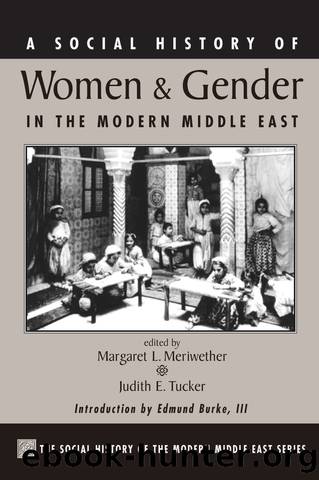A Social History of Women and Gender in the Modern Middle East by Margaret Lee Meriwether

Author:Margaret Lee Meriwether [Meriwether, Margaret Lee]
Language: eng
Format: epub
Tags: Middle Eastern, Social Science, Political Science, World, History, Regional Studies
ISBN: 9780429971150
Google: 4QHFDwAAQBAJ
Goodreads: 38634101
Publisher: Routledge
Published: 1998-07-15T00:00:00+00:00
Stage Three: State Feminism
Turkey and Iran, unlike the Mashriq and Egypt, became sovereign states after World War I. After Turkey's war of independence resulted in the establishment of a republic, Atatürk effected dramatic transformations in all domains of Turkish society: political, cultural, religious, economic, and social. One of the first of numerous laws enacted by the new republic was the abolition of the Islamic caliphate. In 1926 the family code was secularized, revised, and modified, using the Swiss civil code as its model. Women were enfranchised, after repeated demands from feminist groups, through a gradual process beginning at the municipal level in 1930 and ultimately resulting in equal enfranchisement with men on the national level in 1935. Polygamy was outlawed, Islamic dress and veiling were actively discouraged by the state, and women were encouraged to enter the workforce and public life.
The woman question, it has been suggested, was a "pawn" in Atatürk's struggle to establish a "republican notion of citizenship" through the modernization, secularization, and westernization of Turkish society.132 Although Atatürk made the issue of women central to these efforts, his goal was not to transform and equalize gender relations so much as to make a complete break with the Ottoman past in order to "catapult Turkey to the 'level of contemporary civilizations' (i.e., Western economies and societies)."133 Despite the fact that women gained important rights in the changes in family law enacted in the 1926 civil codeâsuch as the rights to initiate divorce and inherit equally with menâthey are not equal under the law. Wives remain under patriarchal control in marriage, since only men can have legal status as the head of the household. A woman must request permission from her husband to work outside the home; she must take her husband's name and follow her husband to a new domicile, since only the husband has the right to determine where the couple lives.134
In Iran, a military officer, Reza Khan, took control of the government in a military coup in 1921; events here followed a different yet, in some respects, parallel trajectory. Reza Khan was an admirer of Mustafa Kemal and watched his state-building venture closely.135 Both politicians embraced the notion of establishing strong, centralized states with authority concentrated at the top; in Turkey, it was the ruling People's Party, controlled by Atatürk, that monopolized power. In Iran, Reza Khan directly consolidated power as the autocratic head of state. In 1925 he became shah, establishing the Pahlavi dynasty; he quickly moved to repress any left-wing political currents. The Bolshevik revolution in neighboring Russia in 1917, the proletarianization of urban society, and the rise of a labor movement had all contributed to creating a "radical political atmosphere . . . which resulted in an upsurge of feminism, socialism and communism."136 Reza Shah banned political parties in 1931, stripped the Parliament of power, censored the press, and exiled, imprisoned, or executed leaders of the liberal opposition and leftist parties. The women's movement was not exempt. The offices of the Patriotic Women's
Download
This site does not store any files on its server. We only index and link to content provided by other sites. Please contact the content providers to delete copyright contents if any and email us, we'll remove relevant links or contents immediately.
Spell It Out by David Crystal(36110)
Life for Me Ain't Been No Crystal Stair by Susan Sheehan(35804)
Cecilia; Or, Memoirs of an Heiress — Volume 1 by Fanny Burney(32548)
Cecilia; Or, Memoirs of an Heiress — Volume 2 by Fanny Burney(31947)
Cecilia; Or, Memoirs of an Heiress — Volume 3 by Fanny Burney(31932)
The Great Music City by Andrea Baker(31917)
Professional Troublemaker by Luvvie Ajayi Jones(29651)
The Secret History by Donna Tartt(19053)
We're Going to Need More Wine by Gabrielle Union(19034)
Twilight of the Idols With the Antichrist and Ecce Homo by Friedrich Nietzsche(18624)
All the Missing Girls by Megan Miranda(15958)
Cat's cradle by Kurt Vonnegut(15335)
Pimp by Iceberg Slim(14488)
Bombshells: Glamour Girls of a Lifetime by Sullivan Steve(14057)
For the Love of Europe by Rick Steves(13914)
Norse Mythology by Gaiman Neil(13349)
Talking to Strangers by Malcolm Gladwell(13349)
Fifty Shades Freed by E L James(13233)
The Social Justice Warrior Handbook by Lisa De Pasquale(12187)
